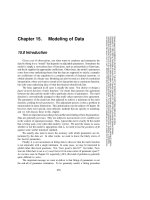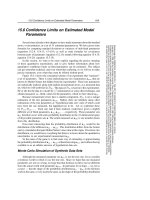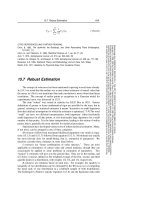Tài liệu Pictures of a Socialistic Future ppt
Bạn đang xem bản rút gọn của tài liệu. Xem và tải ngay bản đầy đủ của tài liệu tại đây (2.04 MB, 162 trang )
PICTURES OF THE
SOCIALISTIC FUTURE
PICTURES OF THE
SOCIALISTIC FUTURE
(Freely adapted from Bebel)
By Eugene Richter
Translation By Henry Wright
Foreword By Bryan Caplan
London
Swan Sonnenschein & Co.
Paternoster Square
1893
Published in 2010 by the Ludwig von Mises Institute
518 West Magnolia Avenue
Auburn, Alabama 36832
Mises.org
Published under Creative Commons Attribution 3.0.
/>ISBN: 978-1-933550-82-4
v
Contents
Foreword: e Writing On e Wall by Bryan Caplan . . . . . . . .vii
1. Celebration Day. . . . . . . . . . . . . . . . . . . . . . . . . . . . . . . . . . . .1
2. e New Laws. . . . . . . . . . . . . . . . . . . . . . . . . . . . . . . . . . . . .5
3. Discontented People . . . . . . . . . . . . . . . . . . . . . . . . . . . . . . . .9
4. e Choice Of Trades . . . . . . . . . . . . . . . . . . . . . . . . . . . . . .11
5. A Parliamentary Sitting. . . . . . . . . . . . . . . . . . . . . . . . . . . . .15
6. Assignment Of Work . . . . . . . . . . . . . . . . . . . . . . . . . . . . . .21
7. News From e Provinces. . . . . . . . . . . . . . . . . . . . . . . . . . .27
8. e Last Day Together . . . . . . . . . . . . . . . . . . . . . . . . . . . . . 31
9. e Great Migration . . . . . . . . . . . . . . . . . . . . . . . . . . . . . . .35
10. e New Currency . . . . . . . . . . . . . . . . . . . . . . . . . . . . . . . .39
11. e New Dwellings. . . . . . . . . . . . . . . . . . . . . . . . . . . . . . . . 43
12. e New State Cookshops. . . . . . . . . . . . . . . . . . . . . . . . . . .47
13. A Vexing Incident . . . . . . . . . . . . . . . . . . . . . . . . . . . . . . . . . 53
14. A Ministerial Crisis. . . . . . . . . . . . . . . . . . . . . . . . . . . . . . . .55
15. Emigration . . . . . . . . . . . . . . . . . . . . . . . . . . . . . . . . . . . . . .57
vi Pictures of the Socialistic Future
16. Retirement Of e Chancellor . . . . . . . . . . . . . . . . . . . . . . . 61
17. In And About e Workshops . . . . . . . . . . . . . . . . . . . . . . .63
18. Family Matters . . . . . . . . . . . . . . . . . . . . . . . . . . . . . . . . . . . 67
19. Recreations Of e People . . . . . . . . . . . . . . . . . . . . . . . . . .71
20. Disagreeable Experiences . . . . . . . . . . . . . . . . . . . . . . . . . . .75
21. Flight. . . . . . . . . . . . . . . . . . . . . . . . . . . . . . . . . . . . . . . . . . .79
22. Another New Chancellor . . . . . . . . . . . . . . . . . . . . . . . . . . .83
23. Foreign Complications. . . . . . . . . . . . . . . . . . . . . . . . . . . . . .87
24. e Election Stir . . . . . . . . . . . . . . . . . . . . . . . . . . . . . . . . . .91
25. Sad News. . . . . . . . . . . . . . . . . . . . . . . . . . . . . . . . . . . . . . . .97
26. e Result Of e Elections . . . . . . . . . . . . . . . . . . . . . . . . .99
27. A Large De cit . . . . . . . . . . . . . . . . . . . . . . . . . . . . . . . . . . 103
28. Domestic A airs . . . . . . . . . . . . . . . . . . . . . . . . . . . . . . . . . 107
29. A Stormy Parliamentary Sitting . . . . . . . . . . . . . . . . . . . . . 111
30. reatened Strike . . . . . . . . . . . . . . . . . . . . . . . . . . . . . . . .127
31. Menacing Diplomatic Notes . . . . . . . . . . . . . . . . . . . . . . . .129
32. Great Strike And Simultaneous Outbreak Of War. . . . . . .133
33. e Counter-Revolution Begins . . . . . . . . . . . . . . . . . . . . .137
34. Disheartening News . . . . . . . . . . . . . . . . . . . . . . . . . . . . . . 141
35. e Last Chapter. . . . . . . . . . . . . . . . . . . . . . . . . . . . . . . . . 143
Postscript . . . . . . . . . . . . . . . . . . . . . . . . . . . . . . . . . . . . . . . . . . 145
vii
Foreword
The Writing On The Wall
I
N the mid-nineteenth century, a new political movement arose:
socialism. Germany was its epicenter. e German Karl Marx
was its leading thinker, and the Social Democratic Party of
Germany its leading organization. e socialists denounced capital-
ist inequality and argued that the obvious solution was government
ownership of the means of production.
From the outset, many questioned the practicality of the social-
ists’ solution. After you equalize incomes, who will take out the
garbage? Yet almost no one questioned the socialists’ idealism. By
1961, however, the descendents of the radical wing of the Social
Democratic Party had built the Berlin Wall—and were shooting
anyone who tried to ee their “Workers’ Paradise.” A movement
founded to liberate the worker turned its guns on the very people
it vowed to save.
Who could have foreseen such a mythic transformation? Out of
all the critics of socialism, one stands out as uniquely prescient: Eugen
viii Pictures of the Socialistic Future
Richter (1838–1906).
[1]
During the last decades of the nineteenth
century, he was the leading libertarian in the German Reichstag, as
well as the chief editor of the Freisinnige Zeitung. Seventy years before
the Wall, Richter’s dystopian novel, Pictures of the Socialistic Future,
boldly predicted that victorious German socialism would inspire
a mass exodus—and that the socialists would respond by banning
emigration, and punishing violators with deadly force.
e mass exodus:
[U]seful people, and people who had really learnt
something, went away in ever-increasing numbers to
Switzerland, to England, to America, in which countries
Socialism has not succeeded in getting itself established.
Architects, engineers, chemists, doctors, teachers, man-
agers of works and mills, and all kinds of skilled work-
men, emigrated in shoals. e main cause of this would
appear to be a certain exaltation of mind which is greatly
to be regretted. ese people imagine themselves to be
something better, and they cannot bear the thought of
getting only the same guerdon as the simple honest day
laborer. (p. 59)
e emigration ban:
[A] decree has been issued against all emigration without
the permission of the authorities.… Old persons who are
beyond work, and infants, are at liberty to go away, but
the right to emigrate cannot be conceded to robust people
who are under obligations to the State for their education
and culture, so long as they are of working age. (p. 57)
e deadly force:
Under these circumstances the Government is to be com-
mended for stringently carrying out its measures to prevent
[1]
For excellent discussions of Richter’s life, thought, and in uence, see Ralph Raico,
“Eugen Richter and Late German Manchester Liberalism: A Reevaluation,” Review of
Austrian Economics 4 (1990): 3–25, and Ralph Raico, “Authentic German Liberalism
of the 19th Century,” Mises Daily (2005), />Foreword: e Writing on the Wall ix
emigration. In order to do so all the more e ectually, it
has been deemed expedient to send strong bodies of troops
to the frontiers, and to the seaport towns. e frontiers
towards Switzerland have received especial attention from
the authorities. It is announced that the standing army will
be increased by many battalions of infantry and squadrons
of cavalry. e frontier patrols have strict instructions to
unceremoniously shoot down all fugitives. (p. 59)
Lord Acton and F.A. Hayek have inspired the two most popular
explanations for the crimes of actually existing socialism. While
Acton never lived to see socialists gain power, their behavior seems
to perfectly illustrate his aphorism that “Power tends to corrupt, and
absolute power corrupts absolutely.”
[2]
For all their idealism, even social-
ists will do bad things if left unchecked. Hayek, with the bene t of
hindsight, suggested a slightly di erent explanation: under socialism,
“the worst get on top.”
[3]
On this theory, the idealistic founders of
socialism were gradually pushed out by brutal cynics as their move-
ment’s power increased.
Richter’s novel advances a very di erent explanation for social-
ism’s “moral decay”: the movement was born bad. While the early
socialists were indeed “idealists,” their ideal was totalitarianism. eir
overriding goals were to engineer a new society and a New Socialist
Man. If this meant treating workers like slaves—depriving them of
the freedom to choose their occupation or location, forbidding them
to quit, splitting up families without their consent, and imposing
draconian punishments on malcontents—so be it.
Richter admittedly presents some of the socialists’ uglier policies—
increased work hours, stringent rationing, massive military spending,
corporal punishment—as slippery-slope responses to deteriorating
conditions. But many of their worst o enses happen early in the novel,
and Mr. Schmidt, the book’s socialist narrator, happily supports them.
[2]
Acton-Creighton Correspondence, Letter 1, />php?option=com_content&task=view&id=1354&Itemid=262.
[3]
F.A. Hayek, e Road to Serfdom (Chicago: University of Chicago Press, 1994),
pp.148–67.
x Pictures of the Socialistic Future
In chapter 6, workers lose the freedom to choose their line of work.
Schmidt’s reaction:
[W]hat has the Government to do in order to bring their
scheme for organizing production and consumption into
some sort of harmony with the entries made by the people?
Should Government attempt a settlement by xing a
lower rate of wages for those branches which showed any
over-crowding, and a higher rate for those labors which
were not so coveted? is would be a subversion of the
fundamental principles of Socialism. (p. 24)
In chapter 7, the government imposes internal passports to prevent
farmers from moving to the greater comfort of the city. Schmidt’s
reaction:
It would unquestionably have been better if those regula-
tions which have only just been issued had been issued at
the very rst. According to these regulations no one can
now temporarily leave his place of residence without rst
providing himself with a leave-of-absence ticket; and no
one can make a permanent removal without receiving such
directions from higher quarters. (p. 29)
In chapter 15, long before conditions become desperate, social-
ist Germany bans emigration—and threatens fugitives with death.
Schmidt’s reaction:
Socialism is founded upon the principle that it is the duty
of all persons alike to labor, just as under the old regime
the duty to become a soldier was a universally recognized
one. And just as in the old days young men who were
ripe for military service were never allowed to emigrate
without authority, so can our Government similarly not
permit the emigration from our shores of such persons as
are of the right age to labor. (p. 57)
What inspired Richter to make these grim—yet uncannily accu-
rate—predictions about the “socialistic future”? e most plausible
Foreword: e Writing on the Wall xi
hypothesis is that Richter personally knew the leading socialists from
the German Reichstag, and saw them for what they were.
[4]
I submit
that he repeatedly peppered the socialists with unpleasant hypo-
theticals, from “Under socialism, who will take out the garbage?” to
“What will you do if skilled workers ee the country?” When socialist
politicians responded with hysteria and evasion, Richter drew the
natural inference: “If this is how these ‘idealists’ deal with critical
questions before they have power, just imagine how they’ll deal with
critical actions after they have power!” As Richter’s proxy explains in
the novel’s climactic speech,
In endeavoring to get rid of the disadvantages of the social-
istic method of manufacture, you place such restrictions
on the freedom of the person, and of commerce, that you
turn Germany into one gigantic prison.… To those in
jail there was, at least, the possibility of an act of pardon,
which might some day open a path to liberty, even to those
who had been condemned to life-long imprisonment. But
those who are handed over to your socialistic prison are
sentenced for life without hope of escape; the only escape
thence is suicide. (pp. 121–22)
Despite their intuitive appeal, the Actonian “power corrupts” and
Hayekian “worst get on top” theories of socialist moral decay seem infe-
rior to Richter’s “born bad” account. Power does indeed lead politicians
to betray their ideals, but from the standpoint of nineteenth-century
socialism, the real “sellouts” were the moderate Social Democrats
who gradually made peace with the capitalist system. e worst do
indeed get on top in totalitarian regimes. But if the early socialists
had not intellectually justi ed extreme brutality, their movement
probably wouldn’t have attracted the many sadists and sociopaths
who came to run it. Only the Richterian theory can readily explain
[4]
Bismarck’s Anti-Socialist Laws (1878–1890) made life di cult for the Social
Democratic Party of Germany, but never imposed an outright ban. e party
bottomed out at 9 seats in the Reichstag in 1878—and jumped up to 35 in 1890
when the Anti-Socialist Laws lapsed. See />in_Germany-German_elections_1871_to_1945.
xii Pictures of the Socialistic Future
why the most devoted surviving child of German socialism grew up
to be the prison state of East Germany: self-righteous brutality was
the purists’ plan all along.
Decades before the socialists gained power, Eugen Richter saw
the writing on the wall. e great tragedy of the twentieth century
is that the world had to learn about totalitarian socialism from bitter
experience, instead of Richter’s inspired novel. Many failed to see
the truth until the Berlin Wall went up. By then, alas, it was too late.
B C
George Mason University
1
C
1
Celebration Day
T
HE red ag of international Socialism waves from the palace
and from all the public buildings of Berlin. If our immortal
Bebel could but have lived to see this! He always used to tell
the bourgeoisie that “the catastrophe was almost at their very doors.”
Friedrich Engels had xed 1898 as the year of the ultimate triumph
of socialistic ideas. Well, it did not come quite so soon, but it has not
taken much longer.
is, however, is immaterial. e main thing is the fact that all
our long years of toil and battling for the righteous cause of the people
are now crowned with success. e old rotten regime, with its ascen-
dency of capital, and its system of plundering the working classes, has
crumbled to pieces. And for the bene t of my children, and children’s
children, I intend to set down, in a humble way, some little account of
the beginning of this new reign of brotherhood and universal philan-
thropy. I, too, have not been altogether without some small share in this
new birth of mankind. All, both in time and money, that I have been
able for a generation past to snatch from the practice of my craft as an
2 Pictures of the Socialistic Future
honest bookbinder, and all that my family could spare, I have devoted
to the furtherance of our aims. I am also indebted to the literature of
Socialism, and to my connection with political clubs, for my mental
culture and my soundness on all socialistic points. My wife and children
are in full accord with me. Our beloved Bebel’s book on women has
long been the highest gospel to my better half, Paula.
e birthday of the new socialistic order happened to be our silver
wedding-day; and now, behold, today’s celebration day has added fresh
happiness to us as a family. My son, Franz, has become engaged to
Agnes Müller. e two have long known each other, and the strong
attachment is mutual. So in all the elevation of mind, inspired by this
great day, we have knit up this new bond of a ection. ey are both
somewhat young yet, but they are, nevertheless, both good hands at
their trades. He is a compositor, she a milliner. So there is ground to
hope it will turn out a good match. ey intend to marry as soon as
the new regulations in respect of work, arrangements of dwellings,
and so on, shall have reached completion.
After dinner we all took a stroll unter den Linden. My stars! what
a crowd there was! And what endless rejoicing! Not one single dis-
cordant tone to mar the harmony of the great celebration day. e
police is disbanded, the people themselves maintaining order in the
most exemplary manner.
In the palace gardens, in the square in front, and all around the
palace, vast crowds were gathered, which showed unmistakable una-
nimity and steadfastness of aim. e new Government was assembled
in the palace. Colleagues, chosen from amongst the foremost lead-
ers of the Socialist party, have provisionally taken over the reins of
Government. e Socialist members of the town council form, for
the present, the corporation. Whenever, from time to time, one of
our new rulers chanced to show himself at one of the windows, or on
a balcony, the uncontrollable ecstasy of the people would break out
afresh, showing itself in frantic waving of hats and handkerchiefs,
and in singing the workmen’s Marseillaise.
In the evening there was a grand illumination. e statues of
the old kings and marshals, decorated with red ags, looked strange
Celebration Day 3
enough in the red glare of so much Bengal re. e days of these
statues are, however, numbered, and they will shortly have to give
place to statues of bygone heroes of Socialism. It has already been
determined, I hear, to remove the statues of the two Humboldts from
the front of the university, and to place there in their stead those of
Marx and Ferdinand Lassalle. e statue of Frederic the Great, unter
den Linden, is to be replaced by that of our immortal Liebknecht.
Upon our return home we kept up, in our cozy family circle, this
double celebration till a late hour. My wife’s father, who hitherto has
not made much account of Socialism, was with us on the occasion,
and was very sympathetic and cheery.
We are full of hope that we shall now soon vacate our humble
dwelling, three storeys high, and exchange it for something better.
Well, well, the old place, after all, has witnessed many a quiet joy of
ours, no lack of trouble and sorrow, and plenty of honest endeavor
as well.
5
C
2
The New Laws
O
NE hears the most exquisite stories of the scramble there is
on the part of the bourgeoisie to get across the frontier. But
where are they to go to? Socialism is now dominant in all
European countries, with the exception of England and Switzerland.
e American steamers are unable to meet the demand there is on
them. ose who can once reach the American shores are all right,
as the Revolution there was very soon quelled, and all hope of suc-
cess cut o for a long time to come. Let all such plunderers clear out,
sayI. It is a good thing that, thanks to the suddenness with which
the Revolution came at last, they have not been able to take much
with them. All State bonds, mortgages, shares, bills, and bank-notes
have been declared void. ese bourgeois gentry may as well at once
begin papering the walls of their ship cabins with this trumpery. All
landed and house property, means of communication, machinery,
tools, stores, and such like, have been impounded for the bene t of
the new socialistic State.
6 Pictures of the Socialistic Future
e Onward, which has hitherto been the leading organ of our
party, now takes the place of the old Imperial Advertiser, and it is
delivered at every house free of cost. All printing establishments
having now become the property of the State, all the other papers
have, as a matter of course, ceased to appear. In all other towns a
local edition of the Onward is issued with a sheet of local matter for
each separate place.
Provisionally, and until such time as a new Parliament shall have
been elected, the conduct of a airs is in the hands of the socialistic
members of the late Parliament, who, in the shape of a Committee
of Government, have to decide on those numerous laws it will be
necessary to enact in order to establish the new era.
e old party program which was settled upon at the Erfurt
Conference in 1891, has been promulgated as an outline of the fun-
damental rights of the people. is promulgation proclaims that all
capital, property, mines and quarries, machinery, means of communi-
cation, and all possessions whatever, have henceforth become the sole
property of the State, or as it is now better called, the Community.
Another decree sets forth the universal obligation there is on all
persons to work; and all such persons, whether male or female, from
the age of 21 to 65 years, are to enjoy precisely the same rights. ose
who are below 21 years of age will be educated at the expense of the
State, whilst those who are above 65 will be maintained in a similar
manner. All private enterprise and productivity have, of course, ceased.
Pending, however, the new regulations as to supply, all persons are
to retain their old posts, and to go on working for the State, as their
master. Each person has to render an inventory of all such things as
may have remained to him after the embargo just spoken of; things
which some might be tempted to regard as private property, such as
furniture, old clothes, bank-notes, and the like. In particular, coins
of all kinds are to be delivered up. New money certi cates are shortly
to be issued.
e new Government, thanks to the smart Chancellor at its head,
proceeds with no less energy than directness of purpose. Every precau-
tion in the rst place is to be taken against any possibility of capital ever
e New Laws 7
regaining its old ascendency. e army is disbanded; no taxes will be
collected, as the Government proposes to raise that which is required
for public purposes out of the revenue yielded by State trade transac-
tions. Doctors and lawyers are supported by the State, and they are
required to render their services gratis whenever needed. e days of
the Revolution, and of the celebration of the same, have been declared
holidays established by law.
It is quite evident that entirely new and glorious times are in
store for us.
9
C
3
Discontented People
A
GNES, our prospective daughter-in-law, is quite inconsol-
able, and Franz is hardly less depressed. Agnes is in fear for
her dowry. For a long time past she has been industriously
saving up, and more especially so since her acquaintance with Franz.
Her industry was such that she would scarce allow herself time for her
meals, and the sums which her companions spent in nery, in pleasures,
or in short excursions, she devoted to the increase of her little capital.
By these means she had no less a sum than two thousand marks in the
savings bank at the time of her becoming engaged. It was with no little
pride and complacency that Franz told me all this on the evening of
the engagement day. e young people began to devise schemes as to
how they could lay out this large sum of money to the best advantage.
But now it seems that all her industry and economy are to prove
quite futile. Rendered uneasy by all sorts of reports that reached her,
Agnes determined to go to the bank and give notice of withdrawal.
Arrived in the neighborhood of the bank, she found the street lled
with excited groups. Old men and women, and numerous girls who
10 Pictures of the Socialistic Future
had been servants during the old order of things, complained piteously
of being cheated, as they said, out of their hard-earned savings. e
o cials, it appears, had stated that along with all other values which,
by the operation of the new decrees had been con scated, the funds
of the savings bank were also void.
e mere rumor of such a thing nearly made poor Agnes faint.
Summoning courage, however, to enter the bank, she there soon
received con rmation of this incredible news. Hastening to us, she
heard it rumored that deputations of bank creditors were on their way
to the palace to seek an interview with the Chancellor. On hearing
this I started o at once, and Franz went with me.
We found an immense crowd gathered in front of the palace.
Across Lassalle Bridge (the old King William’s Bridge), streams of
people kept surging up towards the palace. It is clear this savings bank
question is deeply stirring the public mind. All the entrances to the
courts of the palace were securely fastened. e crowd in front made
various e orts to obtain forcible entrance, but in vain. Suddenly sev-
eral gun-barrels from inside bristled through loopholes in the doors,
which loopholes I had somehow never noticed before.
Who can say what might have been the end of all this if, at this
critical moment, the Chancellor had not appeared on the scene and
thus restored order? He stepped out upon the balcony of the middle
portal, and in a clear and sonorous voice, declared that the savings bank
question should receive the immediate consideration of the Committee
of Government. He begged all true patriots and consistent Socialists
to con de fully in the justice and wisdom of the representatives of
the people. Loud hurrahs greeted our Chancellor as he withdrew.
Just at this moment several re brigades came tearing along at a
gallop from di erent directions towards the palace. ere being now
no police to summon, the authorities had in their consternation tele-
graphed from the palace, reporting a great re there. e arrival of the
gallant fellows was greeted with much laughter. By and by the crowd
dispersed in a more good-humored and pliant mood. It is only to be
hoped that the Government will do the right thing in this business.
11
C
4
The Choice Of Trades
B
IG red placards on all the hoardings remind people that in
accordance with the regulations of the new Labor Law, all
persons of both sexes, between the ages of twenty-one and
sixty- ve years, are required within three days to register themselves
with a view to being told o to some trade. e old police stations
and various other public o ces come in nicely for this purpose. e
attention of women and girls is especially called to the fact that on
their entering upon work in one of the numerous State workshops,
they are forthwith relieved from all household toil, such as taking
care of children, the preparation of meals, nursing the sick, washing,
etc., etc. All children and young people are to be brought up in State
maintenance houses and in public schools. e chief meal of each day
will be taken at the State cookshop of the district. Sick people must
all be sent to the hospitals. Washing can be done solely at the great
central washhouses of the State. e hours of work, for both sexes,
both in trades and in State or public departments, are xed at eight
hours for the present.
12 Pictures of the Socialistic Future
Documentary evidence is in all cases required as a proof of the
capabilities of persons to perform the duties they enter themselves
for; and in each case the business hitherto followed has to be stated
as well. Entries as clergymen cannot for a moment be entertained,
seeing that by a resolution come to at the Erfurt Conference of
1891, and which is now accepted as a fundamental law of the State,
it is strictly prohibited to devote any national funds to religious or
ecclesiastical purposes. Such persons, however, who, nevertheless,
wish to follow this profession, have full liberty to qualify themselves
for it in their leisure hours, after having worked the normal number
of eight hours in some branch which is recognized by the State as
a trade.
After the publication of this intelligence, the life in the streets
resembled that on a mustering day in a garrison town. Persons of
the same trade formed themselves into knots and groups, and having
decorated themselves with some sign of the trade chosen, marched
through the streets singing and shouting. ere were numerous
groups of women and girls, who painted in the liveliest colors the
delights they anticipate from the trades chosen, now that they
have once got rid of all housework. One hears that a great many
persons have chosen an entirely di erent line from the one hitherto
followed. Many seem to fancy that the mere choice of a trade is
identical with being already installed in it, but such is, of course,
by no means the case.
So far as we as a family are concerned we mean to make no
change, but to remain faithful to those old trades we have got to like;
so my son Franz, my future daughter-in-law Agnes, and I myself
have entered our names accordingly. My wife has registered herself
as an attendant at one of the children’s homes. By this means she
proposes still to exercise her maternal care over our youngest child
Annie, four years of age, whom we shall now, of course, have to
yield up.
I may here mention that after the tumult in front of the palace, the
Ministry deemed it prudent to reintroduce a body of police, which is
to be four thousand strong, and to station them in part at the arsenal,









